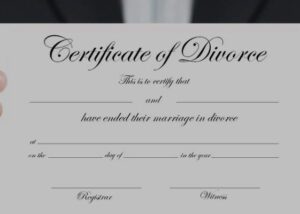Quran
Hadith
Islamic Text
There is a well-known Hadith in which it mentions that three divorces at one time were considered one in the time of the Prophet ﷺ. However, there is evidence to suggest that this was not always the case.
رُكَانَةَ بْنَ عَبْدِ يَزِيدَ طَلَّقَ امْرَأَتَهُ سُهَيْمَةَ الْبَتَّةَ، فَأَخْبَرَ النَّبِيَّ صَلَّى اللهُ عَلَيْهِ وَسَلَّمَ بِذَلِكَ، وَقَالَ: وَاللَّهِ مَا أَرَدْتُ إِلَّا وَاحِدَةً، فَقَالَ رَسُولُ اللَّهِ صَلَّى اللهُ عَلَيْهِ وَسَلَّمَ: «وَاللَّهِ مَا أَرَدْتَ إِلَّا وَاحِدَةً؟»، فَقَالَ رُكَانَةُ: وَاللَّهِ مَا أَرَدْتُ إِلَّا وَاحِدَةً، فَرَدَّهَا إِلَيْهِ رَسُولُ اللَّهِ صَلَّى اللهُ عَلَيْهِ وَسَلَّمَ، فَطَلَّقَهَا الثَّانِيَةَ فِي زَمَانِ عُمَرَ، وَالثَّالِثَةَ فِي زَمَانِ عُثْمَانَ
Rukanah bin Abd Yazid (May Allah Most High be pleased with him) divorced his wife Suhaimah absolutely (Albatah). So, he informed the Prophet ﷺ about it. He said, I swear by Allah (Most High) that I only intended a single divorce. The Messenger of Allah ﷺ said, ‘By Allah you did not intent anything but a single divorce?’ Rukanah said, I swear by Allah (Most High) that I did not intent anything but a single divorce. So, the Messenger of Allah ﷺ (permitted) her to return to him (in marriage). He later divorced her a second time in the era of Umar (May Allah Most High be pleased with him). Then a third time in the era of Uthman (May Allah Most High be pleased with him). (Abu Dawood 2206, Hasan).
This Hadith is also in Ibn Maja (2051). It was considered Hasan by Shaykh Shuayb Arnawut. The Hadith demonstrates that it is possible for a person to divorce multiple times and intend one divorce. It is also possible to intend more than one. This possibility was recognised in the time of the holy Prophet ﷺ. It was considered by the Holy Prophet ﷺ himself. Which is why the Prophet ﷺ asked Rukanah if he intended one (or more).
The fact that the Prophet ﷺ himself considered the possibility of more than one divorce supports the position of Sayidina Umar. In his era, he said that three divorces are to be considered three. This was based on the fact that the practice of the people had changed.
فَالْأَصَحُّ أَنَّ مَعْنَاهُ أَنَّهُ كَانَ فِي أَوَّلِ الْأَمْرِ إِذَا قَالَ لَهَا أَنْتِ طَالِقٌ أَنْتِ طَالِقٌ أَنْتِ طَالِقٌ وَلَمْ يَنْوِ تَأْكِيدًا وَلَا اسْتِئْنَافًا يُحْكَمُ بِوُقُوعِ طَلْقَةٍ لِقِلَّةِ إِرَادَتِهِمُ الِاسْتِئْنَافَ بِذَلِكَ فَحُمِلَ عَلَى الْغَالِبِ الَّذِي هُوَ إِرَادَةُ التَّأْكِيدِ فَلَمَّا كَانَ فِي زَمَنِ عُمَرَ رَضِيَ اللَّهُ عَنْهُ وَكَثُرَ اسْتِعْمَالُ النَّاسِ بِهَذِهِ الصِّيغَةِ وَغَلَبَ مِنْهُمْ إِرَادَةُ الِاسْتِئْنَافِ بِهَا حُمِلَتْ عِنْدَ الْإِطْلَاقِ عَلَى الثَّلَاثِ عَمَلًا بِالْغَالِبِ السَّابِقِ إِلَى الْفَهْمِ مِنْهَا فِي ذَلِكَ الْعَصْرِ وَقِيلَ الْمُرَادُ أَنَّ الْمُعْتَادَ فِي الزَّمَنِ الْأَوَّلِ كَانَ طَلْقَةً وَاحِدَةً وَصَارَ النَّاسُ فِي زَمَنِ عُمَرَ يُوقِعُونَ الثَّلَاثَ دَفْعَةً فَنَفَذَهُ عُمَرُ فَعَلَى هَذَا يَكُونُ إِخْبَارًا عَنِ اخْتِلَافِ عَادَةِ النَّاسِ لَا عَنْ تَغَيُّرِ حُكْمٍ فِي مَسْأَلَةٍ وَاحِدَةٍ. (المنهاج شرح صحيح مسلم بن الحجاج)
The sound opinion is that this used to be the situation in the beginning. When a man said to her (his wife), you are divorced, you are divorced, you are divorced and he did not intend emphasis or a new divorce, the verdict would be of one divorce due to the infrequency of them intending another divorce. Therefore, it was assumed that he intended that which was most predominant. Which was the intention of emphasis (not executing multiple divorces).
Then in the era of (Sayidina) Umar (May Allah Most High be pleased with him), the use of this statement (threefold divorce) became widespread, and the intention of multiple divorces also became prevalent. The assumption of the divorce being three was made, due to that which was prevalent and predominant upon the mind in that era.
It has been said that the norm in the early period was a single divorce. Later, in the era of Umar (May Allah Most High be pleased with him) people started to execute three divorces at once. Therefore (Sayidina) Umar gave his verdict of all three occurring. Based on this it was a matter of notification regarding the change in the norms of people. And not changing the legal ruling (established by the Prophet ﷺ) in the same issue. (Imam al-Nawawi, Sharh Sahih Muslim).
The above explanation provided by Imam al-Nawawi clarifies that Sayidina Umar did not oppose the Prophet ﷺ. Unfortunately, many people have spread this falsehood in our communities. See the link below for a more detailed explanation.
As seen in the Hadith above, it was not an absolute rule, in the time of the Prophet ﷺ, that three divorces meant one, rather both possibilities existed. However, the norm amongst the people was to intend one. Therefore, the legal ruling corresponded with that reality. When this changed in the time of Sayidina Umar, the legal ruling changed.
The word Albatah is mentioned in the Hadith above. The meaning of this word is differed over, as explained by Imam al-Tirmidhi after narrating it in his Jami (1177):
وَيُرْوَى عَنْ عِكْرِمَةَ، عَنْ ابْنِ عَبَّاسٍ أَنَّ رُكَانَةَ طَلَّقَ امْرَأَتَهُ ثَلَاثًا، وَقَدْ اخْتَلَفَ أَهْلُ العِلْمِ مِنْ أَصْحَابِ النَّبِيِّ صَلَّى اللَّهُ عَلَيْهِ وَسَلَّمَ وَغَيْرِهِمْ فِي طَلَاقِ البَتَّةِ، فَرُوِيَ عَنْ عُمَرَ بْنِ الخَطَّابِ، أَنَّهُ جَعَلَ البَتَّةَ وَاحِدَةً وَرُوِيَ عَنْ عَلِيٍّ، أَنَّهُ جَعَلَهَا ثَلَاثًا
It is narrated from Ikrimah, and Ibn Abbas (May Allah Most High be pleased with them both) that Rukanah divorced his wife thrice. Indeed, the scholars amongst the companions of the Prophet ﷺ and others have differed over the issue of absolute divorce (Albatah). It is narrated from (Sayidina) Umar that he considered it to be one. And it is narrated from (Sayidina) Ali that he considered it three.
The upshot of our discussion is that even in the time of the Prophet ﷺ the issue of multiple divorces in one go was dependent upon the intention of the person issuing the divorce. And this did not change in the time of Sayidina Umar. Rather the norm amongst the people changed.
And Allah Most High Knows Best.
-Answered by Shaykh Noorud-deen Rashid (27.06.2022)
See also:
My husband said to me you are divorced three times in one go
See also video:






